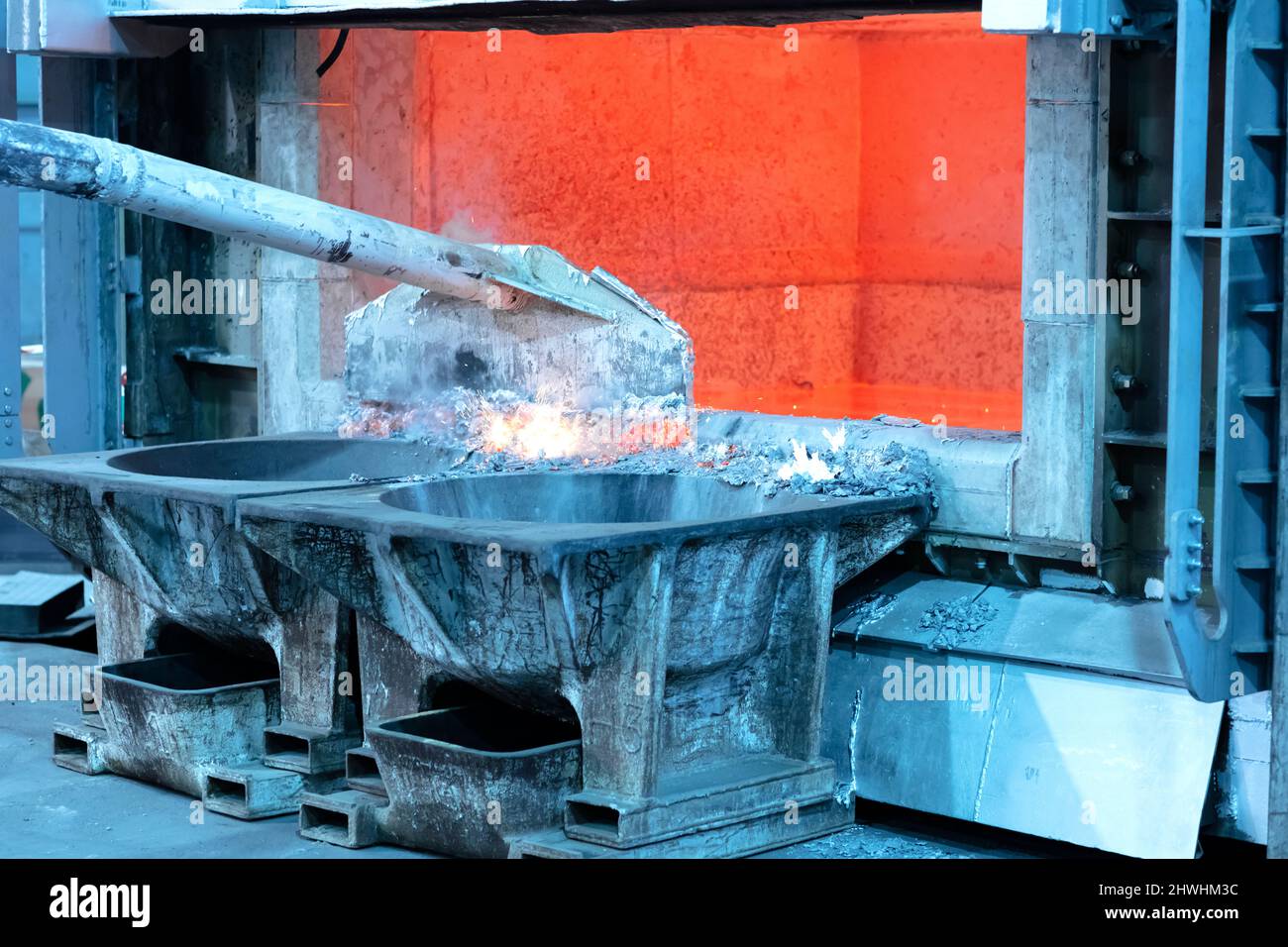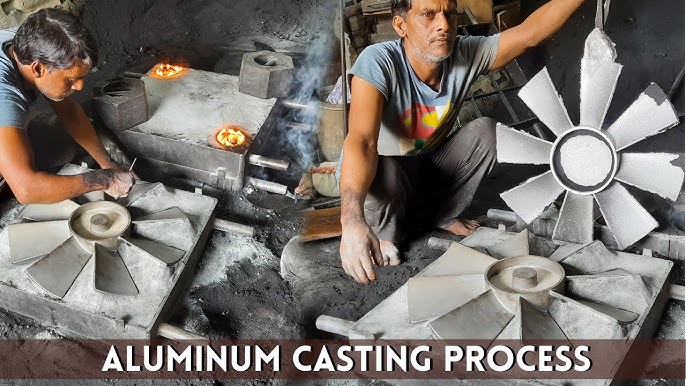Top reasons Aluminum Foundry Wisconsin is essential for casting growth
Understanding the Conveniences and Innovations in the Aluminum Foundry Sector
The Aluminum Foundry industry plays an important function in modern production. Its light-weight properties especially enhance fuel efficiency, particularly in automobile and aerospace markets. On top of that, Aluminum's resistance to deterioration guarantees longevity in various applications. As the sector progresses, advancements such as innovative recycling and additive production are reshaping production techniques. Checking out these improvements exposes not only the benefits but also the challenges in advance for Aluminum shops in a swiftly transforming market.
The Lightweight Benefit of Aluminum
Aluminum's lightweight nature uses considerable advantages across numerous sectors, specifically in production and transportation. Its low density enables the manufacturing of elements that are much easier to install and handle, causing minimized labor expenses and enhanced efficiency. In the automotive sector, lighter cars add to enhanced fuel economy and reduced discharges, aligning with international sustainability objectives. In aerospace, the usage of Aluminum minimizes the general weight of aircraft, which is critical for enhancing efficiency and lowering functional expenses.
In addition, Aluminum's light-weight buildings help with innovative designs that were previously impractical with heavier materials. This versatility makes it possible for suppliers to create intricate forms and frameworks while maintaining structural honesty. On the whole, the lightweight benefit of Aluminum not just enhances product efficiency yet additionally drives improvements in modern technology and design, making it a recommended product in different applications.
Deterioration Resistance and Sturdiness
The Aluminum Foundry sector is renowned for generating products with exceptional rust resistance, making them excellent for various applications. This property, combined with enhanced structural stability, adds to the durable efficiency advantages that Aluminum parts supply. Consequently, industries increasingly count on Aluminum to satisfy demanding environmental conditions without jeopardizing high quality.
Superior Deterioration Resistance
While numerous steels encounter significant challenges from environmental factors, Aluminum stands apart for its exceptional corrosion resistance, making it a favored choice in numerous applications. This residential property is largely as a result of an all-natural oxide layer that creates on the Aluminum surface area, giving an obstacle versus wetness and corrosive agents. Unlike other metals that might rust or degrade gradually, Aluminum keeps its integrity even in severe atmospheres, such as commercial setups or seaside locations. In addition, its light-weight nature integrated with deterioration resistance makes it ideal for applications in aerospace, auto, and marine sectors. Overall, Aluminum's remarkable toughness not just improves product longevity but likewise reduces maintenance prices, providing an engaging benefit for consumers and makers alike.
Improved Architectural Integrity
Engineers and developers progressively identify the importance of enhanced structural integrity in contemporary applications, where both corrosion resistance and sturdiness are crucial. Aluminum alloys, understood for their lightweight buildings, additionally display remarkable resistance to rust, making them appropriate for harsh environments. The ingenious techniques employed in the Aluminum Foundry market contribute considerably to creating parts with improved resilience. Advanced casting procedures and alloy structures are customized to satisfy details performance needs, guaranteeing that frameworks can withstand extreme problems without endangering stability. Surface area therapies and coverings enhance the life expectancy of Aluminum items, further reducing degeneration over time. This concentrate on enhanced structural integrity not only extends the usability of products but additionally lowers upkeep costs, strengthening Aluminum's position as a material of option in different markets.
Resilient Performance Advantages
Resilient efficiency in Aluminum components is mainly credited to their premium deterioration resistance and resilience. Unlike many metals, Aluminum normally creates a protective oxide layer, which avoids rust and wear and tear in various environments, consisting of industrial and marine settings. This intrinsic home significantly prolongs the life-span of Aluminum items, reducing upkeep and replacement expenses. In addition, the lightweight nature of Aluminum improves its applicability throughout sectors without compromising stamina. The product's resistance to put on and tear likewise contributes to its reliability popular applications, making it an optimal choice for auto, aerospace, and building and construction industries. As sectors significantly focus on sustainability and durability, Aluminum's efficiency benefits straighten with contemporary design requirements, solidifying its function in innovative production procedures.
Ecological Impact and Sustainability
 As the Aluminum Foundry sector develops, it increasingly focuses on ecological effect and sustainability, identifying the need for accountable techniques when faced with environment change. Efforts to lessen waste and energy intake are at the center, with several factories adopting reusing initiatives to reclaim Aluminum scrap. This not just reduces resources use yet also significantly lowers power expense, as recycled Aluminum calls for only a fraction of the power contrasted i was reading this to primary manufacturing.
As the Aluminum Foundry sector develops, it increasingly focuses on ecological effect and sustainability, identifying the need for accountable techniques when faced with environment change. Efforts to lessen waste and energy intake are at the center, with several factories adopting reusing initiatives to reclaim Aluminum scrap. This not just reduces resources use yet also significantly lowers power expense, as recycled Aluminum calls for only a fraction of the power contrasted i was reading this to primary manufacturing.Moreover, developments in discharges regulate innovations are being carried out to lower air toxins, straightening procedures with more stringent ecological laws. Shops are likewise exploring alternative power resources, such as solar and wind, to power their centers sustainably. By promoting partnership with stakeholders, the market aims to develop cutting-edge options that boost environmental stewardship. Collectively, these initiatives highlight a dedication to lowering the Aluminum Foundry's carbon impact while promoting a circular economy within the manufacturing sector.
Advanced Manufacturing Techniques
 Reinventing production processes, the Aluminum Foundry sector is progressively integrating sophisticated go right here manufacturing techniques to enhance efficiency and accuracy. Strategies such as computer system mathematical control (CNC) machining and additive production have actually become crucial parts in enhancing production operations. CNC machining enables high-precision element manufacture, considerably reducing material waste and manufacturing time. Additive manufacturing opens up brand-new avenues for intricate geometries and lightweight styles that were previously challenging to achieve.
Reinventing production processes, the Aluminum Foundry sector is progressively integrating sophisticated go right here manufacturing techniques to enhance efficiency and accuracy. Strategies such as computer system mathematical control (CNC) machining and additive production have actually become crucial parts in enhancing production operations. CNC machining enables high-precision element manufacture, considerably reducing material waste and manufacturing time. Additive manufacturing opens up brand-new avenues for intricate geometries and lightweight styles that were previously challenging to achieve.Furthermore, the deployment of automation and robotics in Aluminum foundries simplifies operations, reduces human mistake, and improves employee safety. These innovations promote a more receptive manufacturing setting, enabling makers to adjust rapidly to market needs. The assimilation of advanced simulation software application better enhances the layout and testing phases, causing superior product high quality. Jointly, these strategies not only improve operational efficiency however likewise foster technology, positioning the Aluminum Foundry market at the leading edge of modern-day manufacturing.
Technologies in Recycling Processes
The Aluminum Foundry industry is not just advancing in manufacturing techniques but is also making considerable strides in recycling procedures. Innovations are arising to boost the effectiveness of recycling methods, reducing power intake and enhancing sustainability. Advanced sorting technologies, such as automated optical sorting, enable the recognition and splitting up of Aluminum from other products with high accuracy. This leads to a greater high quality of recycled Aluminum, which is vital for maintaining the honesty of the end products.
Additionally, closed-loop recycling systems are being executed, permitting makers to reuse Aluminum scrap within their very own production procedures. This decreases waste and advertises a circular economic situation. Furthermore, research right into new recycling strategies, such description as hydrometallurgical processes, uses the potential for recuperating Aluminum from complex waste streams. These technologies not only add to decreasing the carbon impact of the Aluminum Foundry industry however additionally reinforce its financial feasibility in a progressively eco conscious market.
Applications Across Numerous Industries
Numerous markets are significantly acknowledging the adaptability and advantages of Aluminum Foundry products, causing prevalent applications across industries such as auto, customer, building and construction, and aerospace goods. In the vehicle market, Aluminum spreadings add to light-weight lorry designs, enhancing fuel efficiency and performance. Aerospace producers use Aluminum elements for their strength-to-weight proportion, essential for aircraft structures and components.
In construction, Aluminum is favored for its sturdiness and resistance to rust, making it suitable for home window structures, roof covering, and architectural assistances. Customer items additionally gain from Aluminum Foundry products, as seen in kitchenware, electronics, and product packaging, where light-weight and recyclable products are crucial.
The versatility of Aluminum Foundry methods enables for accurate specs and elaborate designs, accommodating the diverse needs of these industries. Therefore, Aluminum Foundry items are coming to be indispensable to modern manufacturing procedures throughout various industries.
Future Trends in Aluminum Foundries
As markets proceed to advance, Aluminum foundries are positioned to accept several vital fads that guarantee to improve efficiency and sustainability. One popular trend is the raising adoption of digital modern technologies, including automation and synthetic knowledge, which simplify operations and improve quality assurance. Additionally, the press towards lasting practices is leading shops to invest in reusing innovations, considerably reducing waste and power consumption.
 An additional emerging pattern is making use of sophisticated alloys and products, accommodating the growing need for light-weight and resilient parts throughout different fields (Aluminum Foundry). Furthermore, the integration of additive production methods is prepared for to transform component layout, offering personalization and minimizing preparations
An additional emerging pattern is making use of sophisticated alloys and products, accommodating the growing need for light-weight and resilient parts throughout different fields (Aluminum Foundry). Furthermore, the integration of additive production methods is prepared for to transform component layout, offering personalization and minimizing preparationsCooperation with research institutions is likewise anticipated to drive advancement, as shops look for to create brand-new procedures and products. Aluminum Foundry. Jointly, these fads indicate a transformative future for the Aluminum Foundry industry, lining up with wider objectives of sustainability and performance
Frequently Asked Questions
What Are the Common Expenses Related To Aluminum Foundry Production?
The typical costs connected with Aluminum Foundry manufacturing consist of resources, labor, power, devices upkeep, and overhead costs. These elements collectively influence the overall financial investment required for reliable Aluminum spreading operations.
Exactly How Does Aluminum Compare to Various Other Steels in Stamina?
Aluminum, while lighter than lots of metals, displays excellent strength-to-weight ratios. Contrasted to steel, Aluminum is less solid however uses outstanding corrosion resistance, making it a beneficial choice in applications where weight and sturdiness are vital.
What Security Steps Remain In Area in Aluminum Foundries?
Precaution in Aluminum shops normally include required individual protective tools, ventilation systems to regulate fumes, routine equipment upkeep, training programs for employees, and adherence to rigorous security regulations to lessen risks connected with molten steel handling.
How Is Quality Assurance Managed in Aluminum Casting Processes?
Quality assurance in Aluminum casting procedures includes strenuous evaluations at numerous stages, consisting of raw material analysis, process tracking, and end product testing. Strategies such as statistical procedure control and non-destructive screening guarantee adherence to market criteria.
What Accreditations Are Important for Aluminum Foundry Vendors?
The relevance of accreditations for Aluminum Foundry distributors includes ISO 9001 for high quality monitoring, ISO 14001 for ecological management, and industry-specific requirements like ASTM and SAE, making certain compliance, security, and dependability in making processes.
The Aluminum Foundry market plays a crucial role in contemporary manufacturing. The Aluminum Foundry market is renowned for generating materials with exceptional rust resistance, making them excellent for various applications. Transforming manufacturing procedures, the Aluminum Foundry sector is significantly incorporating advanced manufacturing techniques to enhance effectiveness and precision. The Aluminum Foundry market is not just progressing in producing methods however is additionally making substantial strides in reusing procedures. As markets proceed to advance, Aluminum factories are positioned to welcome numerous essential patterns that promise to enhance performance and sustainability.